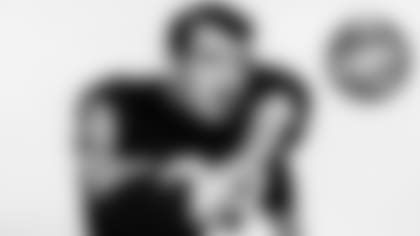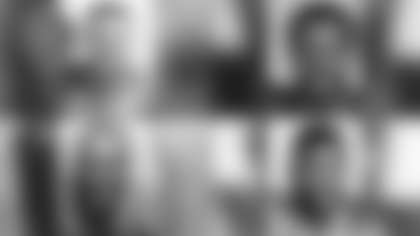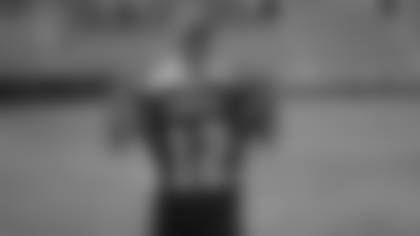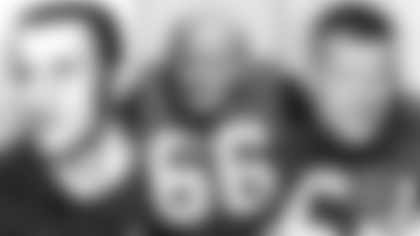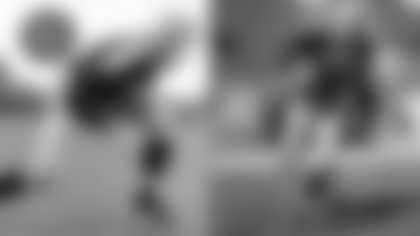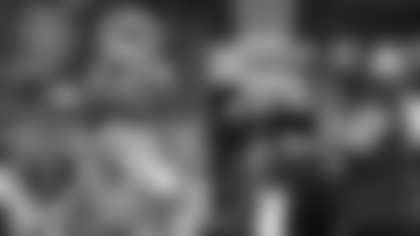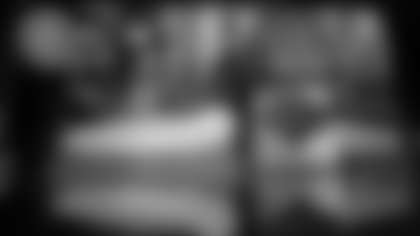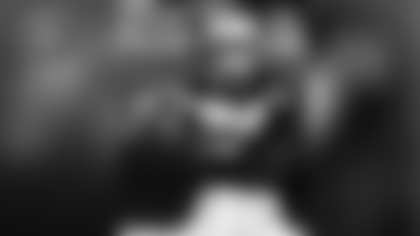Cliff Christl started gathering oral histories with former Packers and others associated with the team in 1996 and will continue to gather them as Packers historian. Excerpts from those interviews will be periodically posted at www.packers.com
The Packers' first-round pick and also the third overall selection in the 1958 NFL Draft, Dan Currie was on course to have as good a career as the three Pro Football Hall of Famers taken after him, only to have it short-circuited by a knee injury. The 1958 draft also yielded Jim Taylor, Ray Nitschke and Jerry Kramer, but Currie was the only one declared an untouchable by Vince Lombardi following his extensive film study of the players he inherited before his first season as coach. Currie, who stood 6-foot-3 and weighed 235 pounds, established himself as the starting left linebacker in Lombardi's first season and was named to the Pro Bowl the next year and to two of the three most widely recognized All-Pro teams the following year. In fact, Currie was selected first-team, All-Pro by the Newspaper Enterprise Association three straight years from 1961 to 1963. The NEA was selected by a league-wide vote of players and maybe the most credible of the All-Pro teams at the time. Currie's career remained on an upswing until Nov. 11, 1962, when he was blindsided by receiver Tommy McDonald and suffered an injury to his left knee in a 49-0 thrashing of the Philadelphia Eagles. Currie returned to play in the 1962 NFL Championship Game and stood out almost as much as Nitschke, the game's MVP, but was never the same player thereafter. Currie played collegiately at Michigan State and was chosen an All-American center as a senior when the colleges were playing one-platoon football. On April 13, 1965, Currie was traded to the Los Angeles Rams for end Carroll Dale. Currie played two seasons with the Rams before being cut prior to the 1967 season. He played for the Packers from 1958 to 1964 and was inducted into the Green Bay Packers Hall of Fame in 1984.
On becoming the starting left linebacker as a rookie in 1958: "I didn't start until Carlton Massey broke his leg (in the third game.) They never really thought about playing me at center."
On joining the Packers in 1958 when they were coming off a 3-9 season and then suffering through a 1-10-1 season as a rookie: "When a team had been doing as bad as the Packers had been doing, you don't have a lot of projection. You're not going anyplace. You're just trying to survive. It wasn't that people weren't working hard. Everybody worked hard. Everybody got along well. There was no dissension on the club. We just didn't have enough direction and guidance."
On whether the horse who galloped around Baltimore's stadium after every Colts touchdown actually dropped dead when the Colts inflicted their 56-0 defeat on the Packers: "I think that's folklore."
On Vince Lombardi's arrival in 1959: "What Vince did was he cleaned up the office. It was much more business-like. You went to the office to do business and if you didn't have business to do, you stayed the hell out of the office. I guess a sense of pride was reestablished. A sense that we were somebody and that we were going to be somebody."
On Lombardi's first training camp: "What is it tough? Everybody's training camp is as tough as the other guy's training camp. What made it tougher was that (Lombardi) stayed after you all the time. Every time you didn't move fast enough, he picked it out. He was after everybody. Everything was done at his time. In the military, you call it double time."
On whether camp was a test of survival: "One thing you noticed Vince didn't have was a lot of big, heavy guys on his team. He preferred guys who were quick."
On the almost daily up-downs, sled work and sprints in Lombardi's first camp: "It don't make any difference, if you do those things in New York or San Francisco, they're a son of a (bleep). But (Lombardi) didn't do them casually. He ran those sons of (bleeps) high speed. You were up and down a lot of times in a very short period of time, which puts you in oxygen debt. Now, you've got to hustle through all the other drills. What it does is get you in shape much faster. And if you're not in shape, you can't take it."
On what it was like playing for Lombardi: "Whatever people say, Vince was a good guy to play for. As long as you did your job, he never bothered you. If you weren't of sound moral standards, you wouldn't stay there very long. But he went after everybody. That's why he was a good coach. He called you all, 'No good sons of (bleeps).'"
On assistant Phil Bengtson, who ran the defense: "Good teacher. Good with his personnel. Good with his people."
On Lombardi's involvement with the defense: "Bengtson ran the film sessions most of the time, although Lombardi would come in and chew us out on occasion. Phil seldom hollered or screamed. He just pointed out our mistakes. In the old locker room, which is now a toilet at the south end of the stadium, we always had our meetings in the visiting locker room. (Lombardi) came in once and started hollering and screaming, walked out and slammed the door. Although he wasn't in the meetings, he wanted to let you know he was still running the show. I said to Phil, 'What the hell was that all about?' He laughed and went back to the movies."
On Tom Bettis, the Packers' starting middle linebacker in Lombardi's first season, most of his second and some of his third in 1961: "Bettis was a good football player. Ray (Nitschke) was a little taller, a little more range."
On Nitschke, who started down the stretch of the 1960 season and finally won the job permanently in 1962: "Ray always had the talent. It was him getting a hold of himself. Once he got rid of most of that (bleep) he learned in Chicago – Ray had a running, (bleeping) battle with people. Like Fuzzy (Thurston) told him one day, 'Ray, why don't you stop with all the (bleeping) (b.s.)? Knock the guy down, tell him he made a great block, go back to the huddle and get your defensive assignment.' Funny thing about it, once Ray did that, he really became a better player. He got rid of the street talk, trash talk. He was a much better player after that. Of course, there were also the social things. He got married, stopped all the drinking and stopped all the other stuff."
On Emlen Tunnell, veteran safety acquired by Lombardi in 1959 for his leadership: "Emlen was a very good team player. He communicated very well. He helped us establish a lot of pride with our defense. And he knew where the big plays were going to be made. I know he helped me a lot. Communication – where he'd be at certain situations, where your support was."
On Willie Davis, the left defensive end in front of him: "Willie was very smart. Extremely good athlete. Quick. A great team player."
On Hank Gremminger, the left cornerback who played behind him for most of Lombardi's first three seasons: "He had good size and speed. Henry could run. He was a Southern Baptist, straight-laced. German on top of it. He was good and he knew he was good."
On whether the Packers became a closer-knit team under Lombardi: "You have to know Green Bay. It's not a very big place. You run into each other all the time. So we had no dissension. All winning teams have that. The Lions when they won in Detroit with Bobby Layne, they were a very close team. Winning teams have that aura where they enjoy each other's company. I think it's pretty hard to do if you don't have that. We talked a lot of football when we were drinking beer after practice."
On the bars Lombardi put off limits when he came to Green Bay: "He put the Piccadilly off limits. I think there was another little bar, too."
On whether the players took their chances and still went to the Piccadilly: "I remember we used to go there. (But) it was always at 1 o'clock in the morning when we went there. Loaded at 1 o'clock in the morning. At that time, you didn't give a (bleep) anyway."
On Paul Hornung: "He was our leader. Sure. If Jimmy (Taylor) gained 100 yards, we usually won. But for Jimmy to gain 100 yards, Paul had to block well because Jimmy made an awful lot of his yards off the short side (or weak side) of the formation."
Any one particular leader on defense: "A lot of people."
On Lamar McHan, who shared the quarterback duties with Bart Starr in Lombardi's first two seasons: "He wouldn't listen. He wasn't the student of the game that Vince wanted."
On his knee injury: "It was 1962. Tommy McDonald blindsided me. I had a knee operation after the 1966 season and that ended my career."
On the 26-14 Thanksgiving Day loss to Detroit in 1962: "I'm from Detroit. I'm confronted every time I see those people. I say, 'For (bleep) sake don't you ever play football on other days? That's the only thing in your lifetime that you remember. I go back and see some of my Michigan State teammates that played for the Lions and they have to rehash the whole thing. They haven't won a championship since. That was 40 (now 63) years ago."
On why Lombardi traded him: "He told me that he was trading me because he needed speed at wide receiver. You could see on film, (Dale) had the speed. He just dropped the ball all the time in Los Angeles. Vince cured him of that. The other end of it was that (Dave) Robinson was a No. 1 draft choice and he had to get him into the lineup. So it was an easy thing for him to make."
Currie died in 2017 at age 82. The excerpts here were taken from two interviews conducted in 2003.



